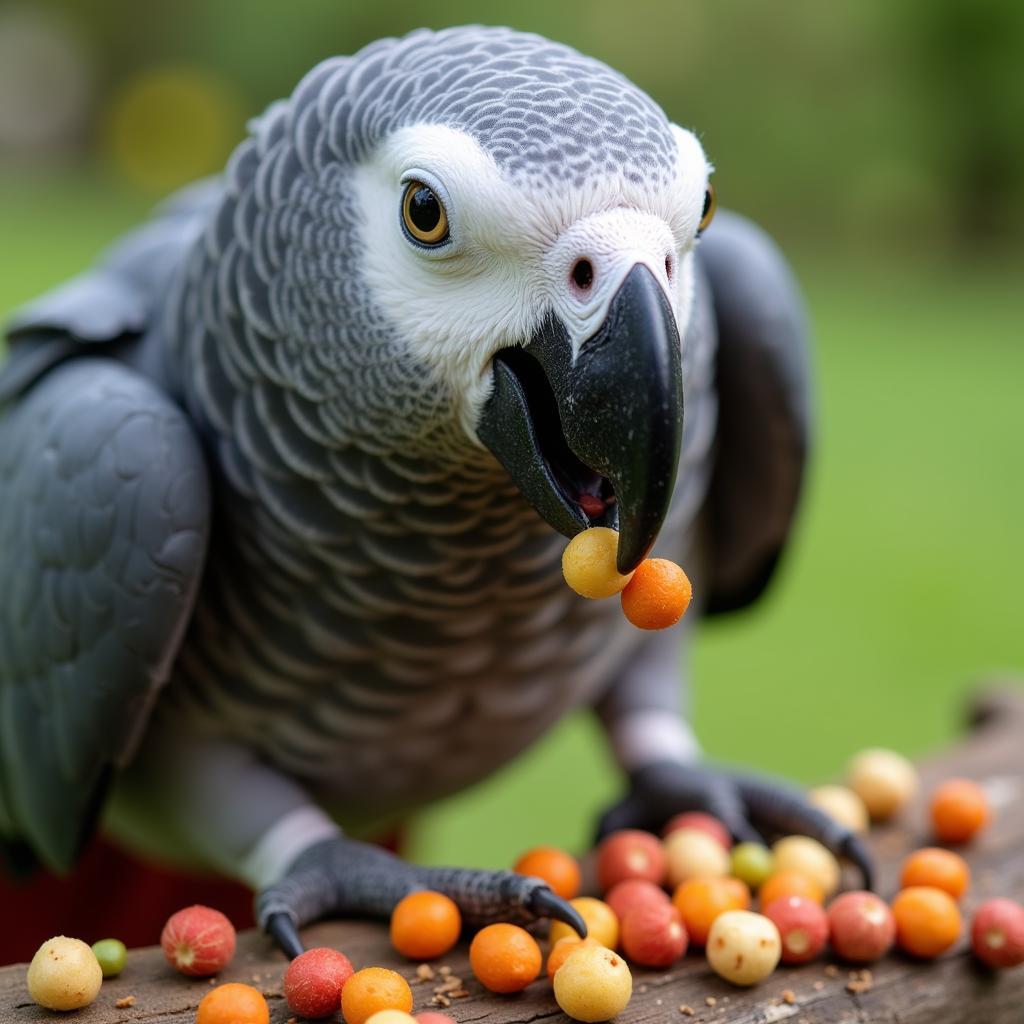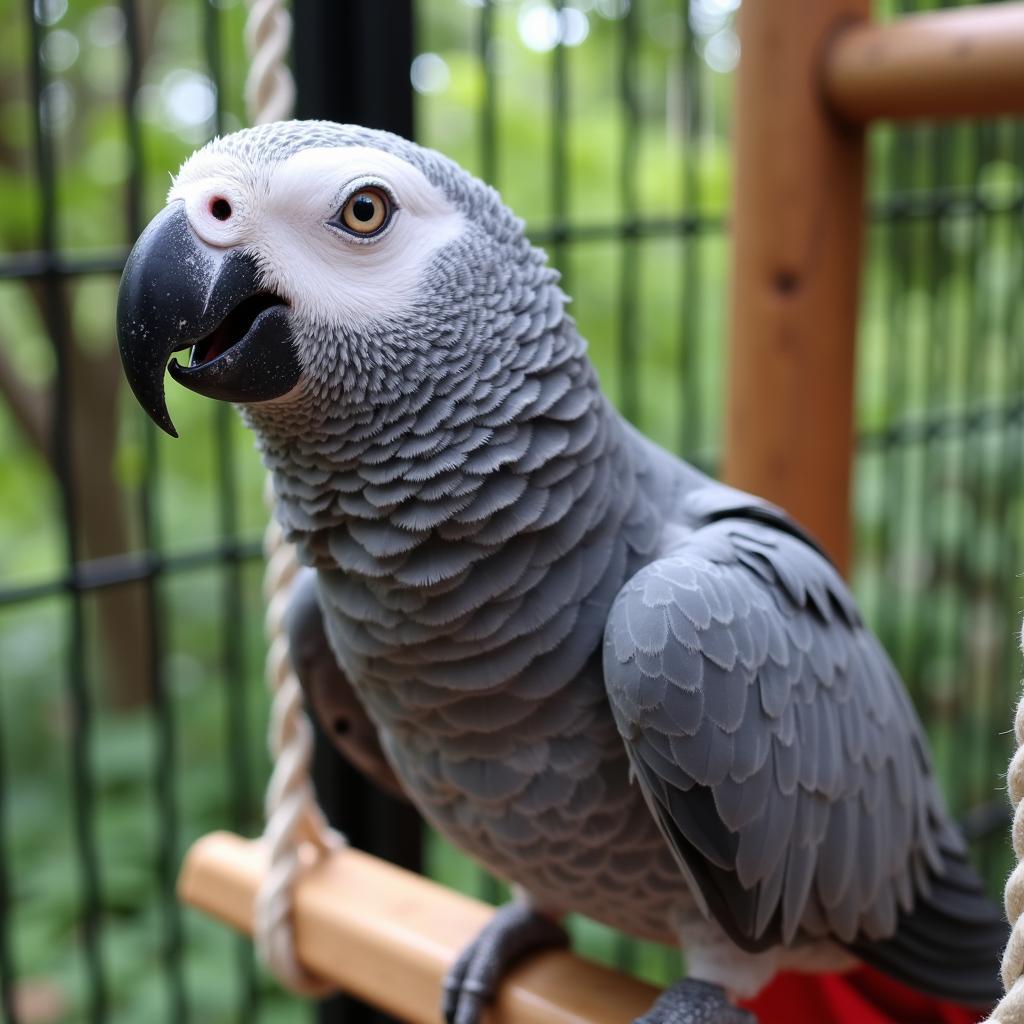The Ultimate Guide to an African Grey Parrot Pellet Diet
African grey parrots, known for their intelligence and charm, require a balanced and nutritious diet to thrive. While a seed-based diet might seem appealing, switching to a predominantly African Grey Parrot Pellet Diet offers numerous benefits for your feathered companion’s long-term health and well-being. This comprehensive guide explores the importance of pellets, how to transition your parrot, and essential factors to consider for their optimal nutrition.
 African Grey Parrot Enjoying Pellets
African Grey Parrot Enjoying Pellets
Why Choose Pellets for Your African Grey?
Seeds, although enjoyed by parrots, are often high in fat and low in essential vitamins and minerals. This can lead to nutritional deficiencies and health complications over time. African grey parrot pellet diets, on the other hand, are specifically formulated to provide a complete and balanced nutritional profile. These pellets contain a mix of grains, seeds, fruits, vegetables, and added vitamins and minerals, ensuring your parrot receives all the nutrients needed for a healthy life.
Benefits of a Pellet-Based Diet
Switching to a African grey parrot pellet diet offers a range of advantages:
- Complete Nutrition: Pellets provide a balanced intake of essential nutrients, minimizing the risk of deficiencies.
- Improved Health: A balanced diet contributes to a stronger immune system, better feather quality, and overall well-being.
- Reduced Waste: Pellets produce less waste compared to seed-based diets, leading to a cleaner cage environment.
- Portion Control: Pellets make it easier to monitor and control your parrot’s food intake, helping to maintain a healthy weight.
Transitioning Your African Grey to Pellets
Transitioning your parrot to a pellet-based diet requires patience and consistency. Here’s a step-by-step guide to make the process smoother:
- Gradual Introduction: Start by mixing a small amount of pellets with your parrot’s current food.
- Increase Proportion: Gradually increase the proportion of pellets while decreasing the amount of the old food over a period of several weeks.
- Offer Variety: Try different pellet brands, flavors, and shapes to find what your parrot prefers.
- Persistence is Key: Don’t get discouraged if your parrot is hesitant at first. Continue offering pellets daily, and they will eventually adapt.
Choosing the Right Pellets
Not all pellets are created equal. When selecting African grey parrot pellet diet options, consider the following:
- Quality Ingredients: Look for pellets made with high-quality ingredients, such as whole grains, fruits, and vegetables.
- No Artificial Colors or Flavors: Choose pellets free from artificial colors, flavors, and preservatives.
- Pellet Size: Select a pellet size appropriate for your parrot’s beak size.
- Brand Reputation: Opt for reputable brands known for producing high-quality bird food.
 Thriving African Grey Parrot on a Pellet-Based Diet
Thriving African Grey Parrot on a Pellet-Based Diet
Supplements and Fresh Foods
While pellets should make up the majority of your African grey’s diet, it’s essential to supplement with fresh fruits, vegetables, and occasional healthy treats.
- Fresh Produce: Offer a variety of fresh fruits and vegetables daily, such as leafy greens, berries, apples, and carrots.
- Healthy Treats: Nuts, seeds, and cooked legumes can be given in moderation as treats.
Monitoring Your Parrot’s Health
Regularly monitoring your parrot’s weight, droppings, and overall behavior is crucial for ensuring they are thriving on a pellet-based diet. If you notice any significant changes, consult with an avian veterinarian.
Conclusion
Transitioning your African grey parrot to a predominantly pellet-based diet is a significant step towards ensuring their long-term health and well-being. By choosing high-quality pellets, offering fresh foods, and monitoring their health, you can provide your feathered companion with the best possible nutrition for a happy and vibrant life.
Do you want to learn more about caring for your African Grey parrot? Check out our article on the African grey conure.

